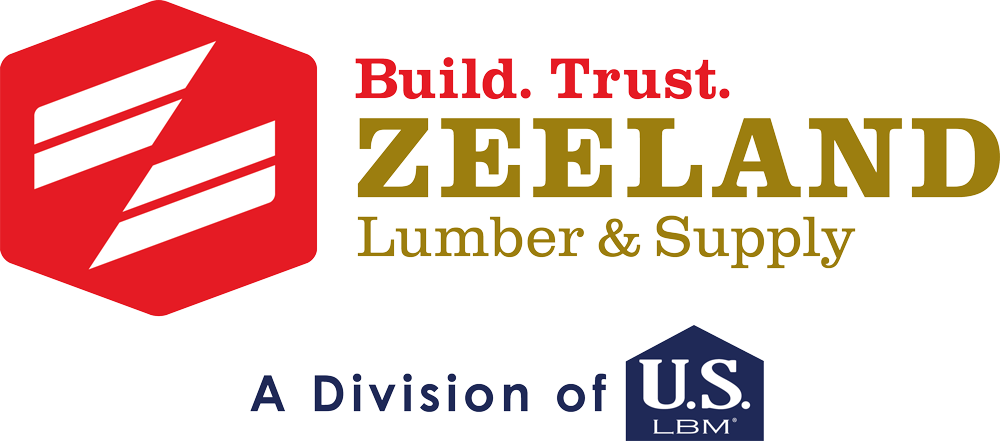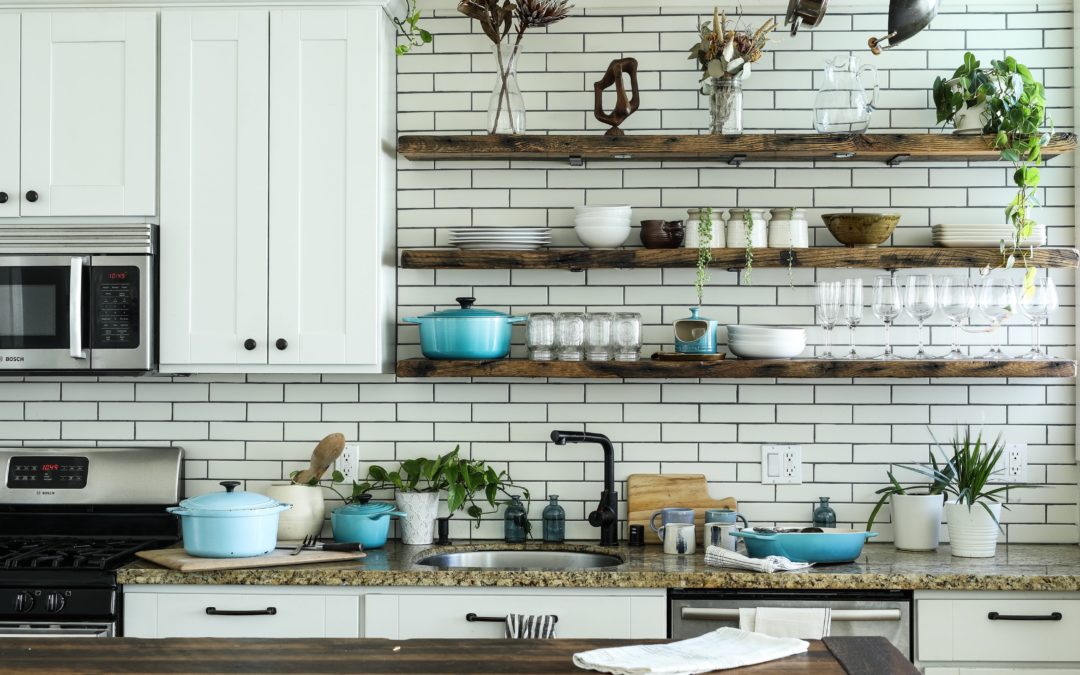Choosing a countertop material is one of the biggest decisions to make when you’re designing or remodeling a kitchen or bathroom. Countertops are often a focal point in a room, and can be a significant investment in the beauty and function of a space. If you’re deciding which countertops are right for your space, it’s worth it to fully understand all of your options.
That’s why we’ve put together this ultimate guide to countertop materials — to help you determine what your top countertop material options are and which might be best for you depending on your budget, style, and what you want in terms of durability and upkeep.
Granite Countertops
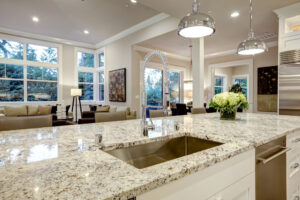
Granite is a natural stone, which means it isn’t engineered or manufactured like quartz or other countertop materials. Granite used for countertops is mined directly from the earth and then cut into slabs. This gives every piece of granite unique characteristics — no two slabs are exactly alike.
For that reason, it’s important to purchase granite for your countertops all at once. While a great quantity of one color might be available now, it will be really hard to match your granite countertops a few years down the road.
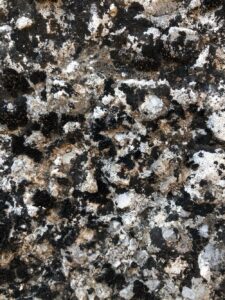
When it comes to performance, granite offers all of the benefits you’d expect from solid stone. It’s exceptionally durable and very heat resistant, so you don’t have to worry about hot pots burning, melting, or staining your countertops.
That said, depending on the type of granite you choose, you may have to exercise a bit of care. While darker granite colors are made from igneous rocks that are impervious to staining and etching, some lighter options could stain or scratch. Because granite is a natural stone, it is slightly porous, which means you will have to seal it every so often.
Cost-wise, granite is very reasonable for a solid stone countertop surface. Though it will cost more than something like butcher block or laminate, it’s typically a bit less expensive than most quartz or marble countertop selections.
Granite Countertop Pros & Cons
Pros
- Heat resistant
- One-of-a-kind color
- Natural stone appearance
- Relatively low-cost for solid stone
Cons
- Lighter granite may scratch, etch, or stain
- Can be difficult to find large selections of matching slabs
Quartz Countertops
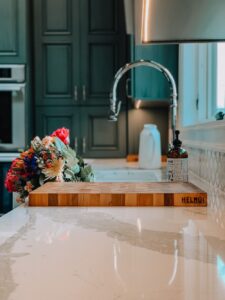
Quartz countertops are an engineered product. Though they are made with quartz, a naturally occurring mineral, they’re manufactured by grinding up the quartz and then pressing it into slabs that are glued together with resin. In the end, a quartz countertop slab ends up being about 90% quartz and 10% resin, which delivers an exceptionally durable, non-porous material that’s great for countertops.
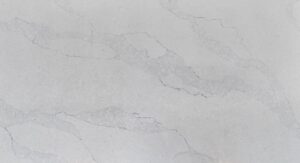
Quartz is a popular countertop material because it can be manufactured to match any color or style, and many options present a more affordable version of natural stone material, such as marble. Whether your aesthetic is all-white everything or cozy cottage-core, there’s a quartz countertop option that will fit your space beautifully.
Though a quartz countertop will certainly cost more than a laminate countertop, they are more durable, and many prefer engineered stone’s natural, polished look. Zeeland Lumber & Supply is proud to partner with Cambria Countertops, a manufacturer of some of the finest engineered stone selections on the market.
Quartz Countertop Pros & Cons
Pros
- Exceptional durability
- Non-porous
- Wide range of repeatable color options
- More affordable than similar-looking natural stone
Cons
- Not as heat resistant as other natural stones, due to the resin in quartz countertops
- Costs more than other engineered countertop materials
Butcher Block Countertops
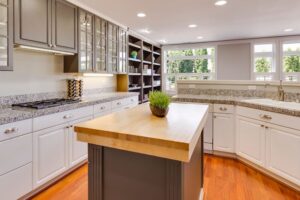
Butcher block countertops are a popular countertop option for industrial, rustic, and farmhouse-style homes because they bring a lot of natural warmth into the kitchen. Butcher block is also popular as a kitchen island countertop material as it can pair or contrast nicely with nearly any other countertop material.
There are two main types of butcher block countertops — end grain and edge grain.
- End grain counters are made from the ends of the boards glued together, so the grain of the wood runs perpendicular to the surface of the counter.
- A bit less expensive, edge grain is made by gluing long boards together, so their side edges form the surface of the counter. These counters will show wear a bit more easily but are less expensive.
Butcher block countertops are well-loved for their appearance and their longevity. When properly cared for, a butcher block counter can last for quite some time. Small dings and scratches are easily mended with the swipe of an oiled rag. Butcher block counters are also well known for being the easiest to install yourself.
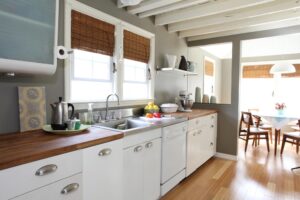
While butcher block countertops are a beautiful option, they aren’t without their negatives. Wood is very prone to water damage, which can be problematic in a kitchen. Wood counters around your sink can be problematic, even if you keep up with regular staining. Wood is also porous. If it’s not sealed regularly, it can harbor germs from food in the kitchen.
Butcher Block Countertop Pros & Cons
Pros
- Trendy and attractive
- Long-lasting, durable material
- Easy and fast installation
- Potential to DIY
Cons
- Requires significant maintenance
- Susceptible to water damage
- Porous and can harbor germs
- Relatively expensive considering the material and maintenance
Laminate Countertops
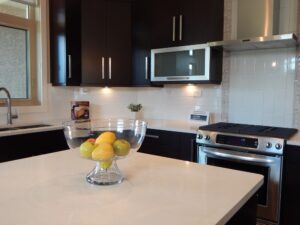
Laminate countertops come in a variety of colors, and have seriously improved over the years in their ability to mimic the appearance of stones like quartz and granite. They’re also a budget-friendly option that can be made to suit any style or size kitchen or bath.
Laminate countertops are made up of a mixture of wood and paper products (wood particle material), sandwiched together with glue and resin. This thick slab of countertop is then topped with a layer of plastic that is laminated onto the wood particle core.
While laminate is the go-to budget choice for many homeowners, they are not as durable or heat-resistant as natural stone options. The lifespan of a laminate countertop surface is generally around 10 years.

While laminate countertop design is becoming more and more realistic, it’s still not quite the same as real stone and will look slightly different from a true stone pattern. In addition to stone-look patterns, laminate countertops do come in wood-look options. Some of these wood laminate options look more realistic than the stone versions and are often sustainably made.
Laminate Countertop Pros & Cons
Pros
- Inexpensive to purchase and install
- Can mimic stone or wood look or color
- Fast and easy installation
Cons
- Not as durable as solid stone
- Appearance is usually a replica of stone, not a perfect match
- Lower durability (about 10 years)
Marble Countertops
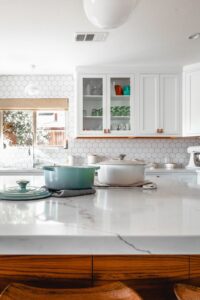
Long considered the holy grail of countertop materials, marble is certainly a beautiful stone countertop option. Like granite, marble is a naturally occurring stone. That means it’s mined from the earth and cut into slabs for countertops, so each marble slab will also feature a bit of variation from piece to piece.
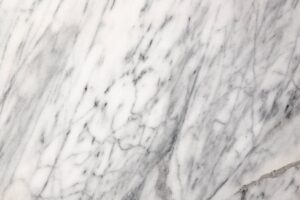
Marble is highly heat resistant, which makes it a great material for the kitchen, where hot pots and pans are always shuffling around. It’s not a conductor, which means it also provides a relatively cool worksurface — this is why you often see marble countertops in baking applications. Marble is also known for its soft veins that impart a particularly elegant quality to any room.
Though marble is a beautiful, durable countertop material, it is slightly softer than both granite and quartz. This makes it more susceptible to scratching, etching, and staining. Because it is also porous, marble must be sealed regularly, in order to keep it from absorbing bacteria found in the kitchen or bathroom.
Marble Countertop Pros & Cons
Pros
- Luxurious, elegant appearance
- Long-lasting material
- Softer vein patterns for a smoother look
Cons
- Can scratch, stain, and etch
- Is porous and requires regular maintenance
- Costly
Which Countertop Material Is Right for Your Home?
In truth, there’s no wrong answer when it comes to choosing a countertop material for your home—granite, quartz, marble, laminate, and butcher block all offer attractive options. The right countertop for your kitchen, bathroom vanity, or wet bar depends on your aesthetic and style, price point, and functionality needs.
No matter which of these countertop material options is best for your project, Zeeland Lumber & Supply carries a variety of colors and styles from leading countertop brands. Whether you already know what you want or would like help weighing the options, our Kitchen and Bath Team is here to help — get in touch with us today!
